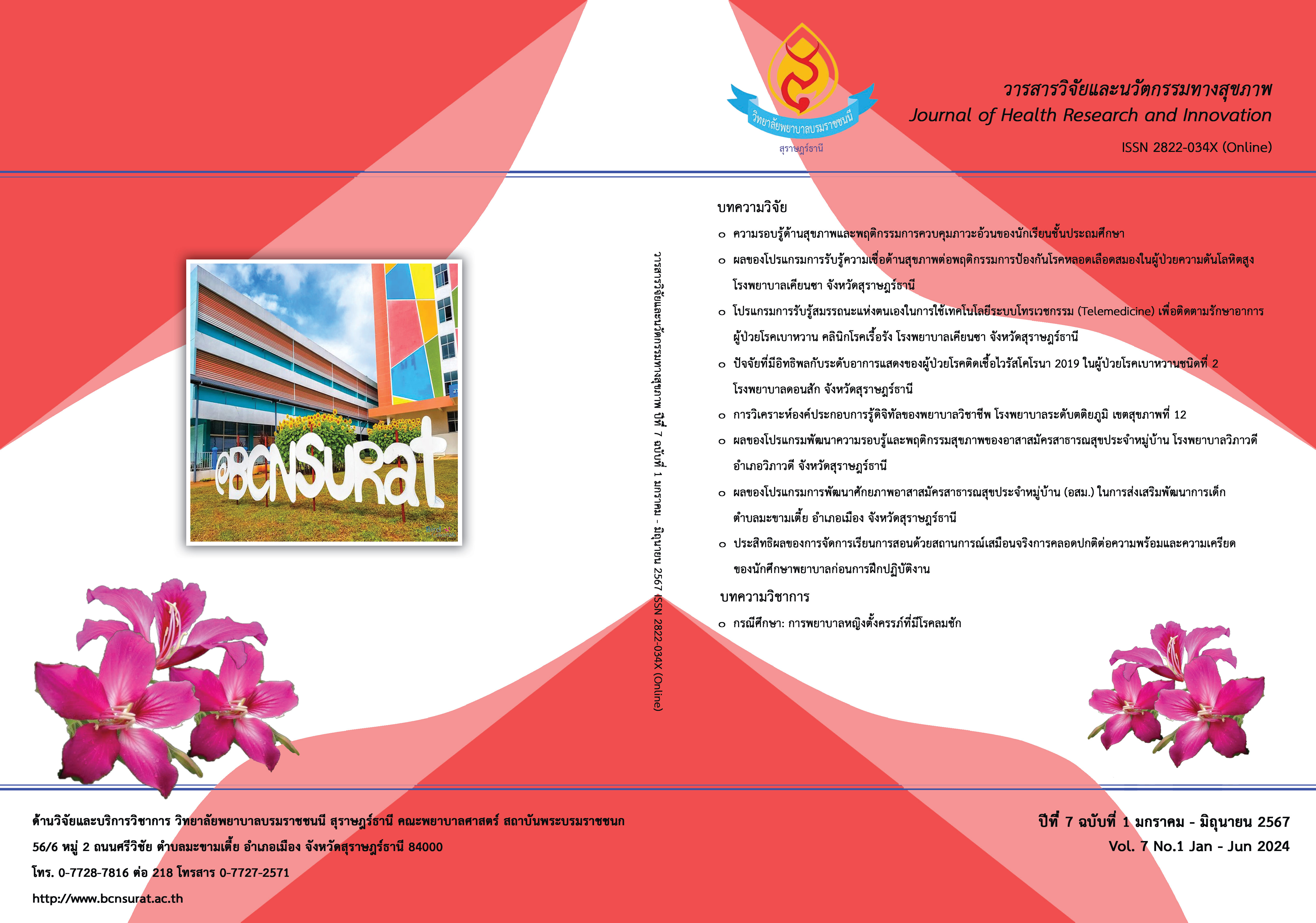ผลของโปรแกรมพัฒนาความรอบรู้และพฤติกรรมสุขภาพของอาสาสมัครสาธารณสุข ประจำหมู่บ้าน โรงพยาบาลวิภาวดี อำเภอวิภาวดี จังหวัดสุราษฎร์ธานี
คำสำคัญ:
ความรอบรู้, พฤติกรรมสุขภาพ, โปรแกรมพัฒนาความรอบรู้และพฤติกรรมสุขภาพบทคัดย่อ
การวิจัยกึ่งทดลองแบบกลุ่มเดียววัดก่อนหลังครั้งนี้มีวัตถุประสงค์เพื่อศึกษาผลของโปรแกรมพัฒนาความรอบรู้และพฤติกรรมสุขภาพของอาสาสมัครสาธารณสุขประจำหมู่บ้าน โรงพยาบาลวิภาวดี อำเภอวิภาวดี จังหวัดสุราษฎร์ธานี กลุ่มตัวอย่าง ได้แก่ อาสาสมัครสาธารณสุขประจำหมู่บ้านในเขตโรงพยาบาลวิภาวดี จังหวัดสุราษฎร์ธานี คัดเลือกแบบเฉพาะเจาะจง จำนวน 6 หมู่บ้าน หมู่บ้านละ 5 คน จำนวน 30 คน เครื่องมือที่ใช้ในการทดลอง ประกอบด้วย โปรแกรมพัฒนาความรอบรู้และพฤติกรรมสุขภาพด้านการสร้างสัมพันธภาพ ประเมินพฤติกรรมเสี่ยงและวิเคราะห์สาเหตุ พัฒนาความรอบรู้ด้านสุขภาพและพฤติกรรมสุขภาพ การแลกเปลี่ยนเรียนรู้ วางแผนการดูแลตนเอง และติดตามพฤติกรรมสุขภาพ เก็บรวบรวมข้อมูลด้วยแบบสอบถาม ประกอบด้วย แบบประเมินความรอบรู้ด้านสุขภาพและแบบประเมินพฤติกรรมสุขภาพ มีการหาความตรงเชิงเนื้อหาโดยให้ผู้ทรงคุณวุฒิจำนวน 3 ท่าน ประเมินดัชนีความสอดคล้องระหว่างข้อคำถามกับวัตถุประสงค์การวิจัย พบว่ามีค่าดัชนีความสอดคล้องระหว่างข้อคำถามกับวัตถุประสงค์มากกว่า .67 ทุกข้อ ผ่านการทดสอบความเชื่อมั่นโดยวิธีอัลฟาของครอนบาคเท่ากับ .82 และ .87 ตามลำดับ เก็บรวบรวมข้อมูลระหว่างเดือนมีนาคม 2565 - กรกฎาคม 2565 วิเคราะห์ข้อมูลด้วยสถิติร้อยละ ค่าเฉลี่ย ส่วนเบี่ยงเบนมาตรฐาน และการทดสอบค่าทีแบบสัมพันธ์ ผลการวิจัย พบว่า
1. ความรอบรู้ของกลุ่มตัวอย่างหลังเข้าร่วมโปรแกรมพัฒนาความความรอบรู้และพฤติกรรมสุขภาพของอาสาสมัครสาธารณสุขประจำหมู่บ้าน โรงพยาบาลวิภาวดี อำเภอวิภาวดี จังหวัดสุราษฎร์ธานี มีค่าสูงขึ้นอย่างมีนัยสำคัญทางสถิติ (p< .01)
2. พฤติกรรมสุขภาพของกลุ่มตัวอย่างหลังเข้าร่วมโปรแกรมพัฒนาความความรอบรู้และพฤติกรรมสุขภาพของอาสาสมัครสาธารณสุขประจำหมู่บ้าน โรงพยาบาลวิภาวดี อำเภอวิภาวดี จังหวัด สุราษฎร์ธานี มีค่าสูงขึ้นอย่างมีนัยสำคัญทางสถิติ (p< .01)
ควรนำโปรแกรมพัฒนาความรอบรู้และพฤติกรรมสุขภาพของอาสาสมัครสาธารณสุขประจำหมู่บ้านไปใช้ในการเสริมสร้างความรอบรู้และพฤติกรรมสุขภาพในกลุ่มประชาชนวัยทำงานและกลุ่มอื่นๆ เพื่อให้ประชาชนมีความรอบรู้และพฤติกรรมสุขภาพที่ถูกต้อง
เอกสารอ้างอิง
Anderson, L. W., & Krathwohl, D. R. (2001). A Taxonomy for Learning, Teaching, and Assessing: A Revision of Bloom's Taxonomy of Educational Objectives. New York: Longman.
Arahung, R., Hoontrakul, S., Roojanavech, S. (2017). The Effects of Health Literacy Enhancement Program on Hypertensive Prevention Behavior of Pre-hypertension Risk Group at a Community in Nakhon Pathom Province. Unpublished master’s thesis, Christian University. (in Thai)
Bartz,Albert, E. (1999). Basic Statistic Concept. New Jersey: Prentice-Hall, Inc.
Benjamin, S Bloom. (1986). ‘Learning for Mastery’. Evaluation Comment. Center for the Study of Instruction Program. University of California at Los Angeles, (2), 47-62.
Charoenjit, U. (2018). Effects of Health Promotion Programs on Health Literacy and Health Behavior of Diabetes Patients of Community Health Center Banpong Hospital. Hua Hin Sook Jai Klai Kangwon Journal, 3(2), 58-72. (in Thai)
Chiangkhong, A. (2018). Effectiveness of the Development of Health Literacy though controlled Transformative Learning due Glycemic Control Behavior among Diabetic Patients. Unpublished dotoral dissertation, Srinakharinwirot University, Thailand. (in Thai)
Cho, Y.I., Lee, S.Y.D., Arozullah, A.M. and Crittenden, K.S. (2008). Effects of Health Literacy on Health Status and Health Service Utilization Amongst the Elderly. Social Science & Medicine, 66, 1809-1816.
Chow, S.- C., Shao, J., & Wang, H., (2003). Sample Size Calculations in Clinical Research (2nded.) Champman & Hall/CRC, 51.
Department of disease control. (2021). Surveillance, Prevention and Control of Non -Communicable Diseases. Annual report 2021. Retrieved January 16, 2021, from https://online.fliphtml5.com.
Department of Health. (2020). 3E.2S. Disease Prevention Code. Nonthaburi: Department of Health Ministry of Public Health. (in Thai)
Division of health education. (2017). Strengthening and Assessing Health Literacy and Health Behaviors. Retrieved January 16, 2021, from http://www.hed.go
Division of Health Education. (2019). Report on the Results of the Assessment of Health Literacy and Health Behavior. Bangkok: Department of health service support Ministry of Public Health. (in Thai)
Kaewdamkerng, K. (2021). In-depth Health Literacy. In the Document of the 18th National Conference on Health Education on the Development of Health Behaviors in the 4.0 era. Department of Health Education and Behavioral Sciences. Faculty of Public Health Mahidol University Bangkok: Mahidol University, 8-23. (in Thai)
Health Data Center, Ministry of Public Health. (2021). Situation of Non-Communicable Diseases. Retrieved January 16, 2021, from https://hdcservice.moph.go.th/hdc.
Health Education Division. (2021). Report on the Results of Operations to Develop Health Literacy and Health Behavior for the Year 2021. Retrieved January 22, 2022, from http://www.hed.go.th/linkHed/442.
Lhumrod, N., Klumpakorn, S., & Sillaboot, J. (2019). Effects of the Village Health Volunteer Potential Development Program on Health Literacy in Smoking Cessation Aid. Journal of Health Science Research, 13(1), 84-94. (in Thai)
Niammuenwai, A. (2019). Effectiveness the Development Program on Health Literacy and 3e.2S. Health Behaviors of the Village Health Volunteers Health Manager in Banlueam District, Nakhon Ratchasima Province. Health Research and Development Nakhon Ratchasima Provincial Public Health Office Journal, 4(2),78-92. (in Thai)
Nutbeam, D. (2008). Health Literacy as a Public Health Goal: a Challenge for Contemporary Health Education and Communication Strategies into Health 21st Century. Health Promotion International 2000, 15(8), 259-67.
Pengchan, W. (2017). Health knowledge. In the Capacity Development Workshop Document Personnel of the Department of Health on Health Knowledge towards Thailand, Department of Health, Ministry of Public Health. Nonthaburi: Ministry of public health. (in Thai)
Petckong, C., & Banchonhattakit, P. (2019). Effects of Health Literacy Promoting Program with Social Media Used on Obesity Prevention Behavior among Overweight Mattayomsuksa 2 Students. Journal of Health Education, 42(2), 23-32. (in Thai)
Pressey, S. L., Robinson, F. P., & Horrocks, J. E. (1959). Psychology in education. New York: Harper - Collins.
Quinlan, P., Magid, S., Price, K., Lyman, S., & Mandl, L. (2013). The Relationship among Health Literacy, Health Knowledge, and Adherence to Treatment in Patients with Rheumatoid Arthritis. HSS Journal, 9(1), 42-49.
Saentecha, P., & Lamluk, P. (2020). The Effectiveness of a Program for Health Literacy Development in the Patients with Type 2 Diabetes. Thai Journal of Health Education, 43(2), 150-164. (in Thai)
Samruayruen, K., Raktham, Y., Deenonphanao, R., & Thachan, S. (2020). Effect of health literacy programs on self-care behaviors among diabetic patients at Rungnok sub-district, Sam-Ngam district, Phichit province. EAU Heritage Journal Science and Technology, 14(3), 139-148. (in Thai)
Sarakshetrin ,A., Chantra, R., Kwanshom, R., & Ruangdoung, L. (2017). The Effects of Using Health Behavior Changing Program (Food, Exercise, Emotion, Smoking, and Alcohol Cessation) among Village Health Volunteers at Klongchanak, Muang District, Suratthani Province. The Southern College Network Journal of Nursing and Public Health, 4(1). 253-264 (in Thai)
Sookpool, A., Kingmala, C., Pangsuk, P., Yeanyoun, T., & Wongmun, W. (2020). Effectiveness of Health Literacy and Health Behavior Development Program for Working People. Journal of Health Science, 29(3), 419-429. (in Thai)
Sorensen, K., Van den Broucke, S., Fullam, J., Doyle , G., Pelikan, J., Slonska, Z., et al. (2012). Health literacy and public health: A systematic review and integration of definitions and models. BMC Public Health, 12(80), 1-13. (in Thai)
Thepin, K., Moolsart, S., Jantacumma, N. (2019). Effectiveness of a health literacy developmental program in patients with uncontrolled hypertension. Boromarajonani College of Nursing, Uttaradit Journal.11(1),197-212. (in Thai)
WHO. (2013). Global action plan for the prevention and control non-communicable diseases 2013-2020. Geneva: WHO Publications.
ดาวน์โหลด
เผยแพร่แล้ว
รูปแบบการอ้างอิง
ฉบับ
ประเภทบทความ
สัญญาอนุญาต
ลิขสิทธิ์ (c) 2024 วิทยาลัยพยาบาลบรมราชชนนี สุราษฎร์ธานี

อนุญาตภายใต้เงื่อนไข Creative Commons Attribution-NonCommercial-NoDerivatives 4.0 International License.
บทความที่ได้รับการตีพิมพ์เป็นลิขสิทธิ์ของวารสารวิทยาลัยพยาบาลบรมราชชนนี สุราษฎร์ธานี
ข้อความที่ปรากฏในบทความแต่ละเรื่องในวารสารวิชาการนี้เป็นความคิดเห็นส่วนตัวของผู้เขียนแต่ละท่านไม่เกี่ยวข้องกับวิทยาลัยพยาบาลบรมราชชนนี สุราษฎร์ธานี และคณาจารย์ท่านอื่นๆในวิทยาลัยฯ แต่อย่างใด ความรับผิดชอบองค์ประกอบทั้งหมดของบทความแต่ละเรื่องเป็นของผู้เขียนแต่ละท่าน หากมีความผิดพลาดใดๆ ผู้เขียนแต่ละท่านจะรับผิดชอบบทความของตนเองแต่ผู้เดียว



